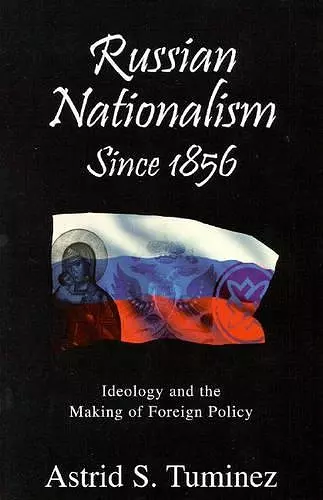Russian Nationalism since 1856
Ideology and the Making of Foreign Policy
Format:Paperback
Publisher:Bloomsbury Publishing PLC
Currently unavailable, and unfortunately no date known when it will be back

Many scholars and analysts see Russian nationalism as a dangerous force, but is widespread concern about the malevolent effects of Russian nationalism-especially on foreign policy-justified? What is the record of nation-building in Russia, and how did nationalism evolve in the multiethnic, Russian empire? What variants of nationalist ideology have been propagated in Russia, and what are their benign or aggressive implications for foreign policy? What triggers the articulation of aggressive nationalism, and what factors facilitate its influence on Russian foreign policy? What Western actions might help or hinder the impact of aggressive nationalism on Russian international behavior? This thoughtful book answers these questions by exploring the range of nationalist ideas that have been propagated in Russia since 1856. Drawing on a wide range of archival documents and unparalleled interview material from the post-Soviet period, Astrid S. Tuminez analyzes two cases—Russian panslavism in 1856-1878 and great power nationalism in 1905-1914—when aggressive nationalist ideas clearly influenced Russian foreign policy and contributed to decisions to go to war. Yet not all forms of nationalism have been malevolent, and the author assesses competing nationalist ideologies in the post-Soviet period to clarify the conditions under which a particularly belligerent nationalism could flourish and influence Russian international behavior. With its implications for U.S.–Russian relations, this study will be essential reading for policymakers and Russia scholars alike.
Tuminez's study of Russian mationalism explores important links between nationalism and foreign policy. Recommended. * Choice Reviews *
This brilliant book illuminates one of the crucial problems of the twenty-first century. No subject arouses stronger emotions, for better and worse, than nationalism. No country's nationalism is more important for humanity's future than Russia's. Dr. Tuminez clarifies the various formulations of Russian nationalism in historical perpective and shows their implications for foreign policy. These insights have worldwide significance. -- David A. Hamburg M.D., president emeritus, Carnegie Corporation of New York
This book argues, in part, that Russia's evolution as a state has been guided for centuries by the imperatives of a sprawling empire. As a consequence, the idea of the people or 'nation' as the arbiter of political authority did not take root. In the past decade, Russians have dismantled the old empire, embarked on democratic reforms, and begun shaping a new state. The future of this new Russia remains unknown, but competing variants of Russian nationalism today are key to shaping that future. Policymakers will gain both historical and practical insights from this well-written and thoughtful work. -- Sam Nunn
The nature of Russian nationalism fascinates, but its make-up is unsufficiently understood. This outstanding book illuminates an area of profound international importance which will help shape the twenty-first century. -- The Rt. Hon. the Lord Owen CH, House of Lords, UK
Perceptive and thoughtful. . . . A fair-minded and astute guide to the complex relationship between Russia’s internal politics and its foreign policy. -- Geoffrey Hosking * Slavic Review *
A well-researched and well-written book that tells an interesting and important story. . . . It will also serve undergraduates as an outstanding survey of the history of Russian nationalism. * H-Net: Humanities and Social Science Reviews Online *
ISBN: 9780847688845
Dimensions: 229mm x 147mm x 19mm
Weight: 454g
352 pages